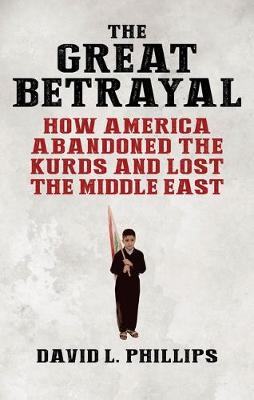Washington Kurdish Institute
January 7, 2019
The Great Betrayal: How America Abandoned the Kurds and Lost the Middle East
The twentieth century saw dramatic changes in the once Kurd-dominated Kirkuk region of Iraq. Following the discovery of oil at Baba Gurgur in the 1920s, Kirkuk became a central priority for successive Iraqi rulers. In the 1970s and 1980s plans for Kirkuk to be the capital of an autonomous Iraqi Kurdistan were decimated by the Baathist regime’s Arabization programme which saw Arabs replacing the Kurds as the significant demographic majority. Despite having repeatedly relied on the Kurdish population of Iraq for military support, on three occasions the United States have abandoned their supposed allies in Kirkuk. The Great Betrayal provides a political and diplomatic history of the Kirkuk region and its international relations from the 1920s to the present day. Based on first-hand interviews and previously unseen sources, it provides an accessible account of a region at the very heart of America’s foreign policy priorities in the Middle East. In September 2017, Iraqi Kurdistan held an independence referendum, intended to be a starting point on negotiations with the Iraqi Government in Baghdad on the terms of a friendly divorce. Though the US, Turkey, and Iran opposed it, the referendum passed with 93% of the vote. Rather than negotiate, Iraq’s Prime Minister Heider al-Abadi issued an ultimatum and then attacked the region. Iraq’s Kurdish population have been abandoned, once again, by their supposed allies in the US. In this book, David L. Phillips reveals the failings of America’s policies towards Kirkuk and the devastating effects of betraying an ally.
About the Author:
David L. Phillips is Director of the Program on Peace-building and Human Rights at Columbia University’s Institute for the Study of Human Rights. He has worked as a senior adviser to the United Nations Secretariat and as a foreign affairs expert and senior advisor to the U.S. Department of State. His previous publications include An Uncertain Ally: Turkey under Erdogan’s Dictatorship; The Kurdish Spring and Losing Iraq. He writes regularly for publications including the New York Times, Wall Street Journal, Financial Times, International Herald Tribune, and Foreign Affairs.
Buy the book HERE.
To talk about his recent book, Dr. David Phillips spoke to the Washington Kurdish Institute (WKI).
WKI: Thank for taking the time and speaking to us. What inspired you to write about US policies toward the Kurds?
Dr. Phillips: I’ve worked on Kurdish issues for thirty years. The US takes Kurds for granted. Kurds never get their just reward. The US doesn’t have many friends in the world. It shouldn’t take the Kurds for granted.
WKI: What steps can be taken for the US administration and future ones to improve their vision toward the Kurds?
Dr. Phillips: The US should support democracy in Iraqi Kurdistan, adjust its failed one Iraq policy and support a process culminating in Iraqi Kurdistan’s independence. Similarly, the US recruited the Kurds in Syria to fight Daesh and could abandon them when Daesh is defeated. Given America’s approach to the Kurds, who will fight and die for the United States in the future
WKI: The US administration remained silent for Kirkuk events in 2017 and the invasion of Afrin by Turkey in 2018, do you think the policy maker and throughout the history consider the Kurds only allies or proxies?
Dr. Phillips: The Kurds are viewed as strategic partners, not allies. Except for Israel, the US has no better friend in the Middle than that Kurds.
WKI: In your opinion how the Kurds should approach the US government to deliver their demands as far as obtaining rights or self-determination?
Dr. Phillips: If Iraq fulfills its constitutional obligations, Kurds can achieve their self-determination without seeking independence. However, Iraq has been unwilling to implement democracy and federalism, including Article 140 that requires a referendum on the status of Kirkuk. Kurds had no choice but to conduct a referendum on independence (25 September 2017), as a starting point for negotiations with Baghdad on a new arrangement.
WKI: Recently you visited Syria where the Kurdish dominated administration hosted you in the northeast. How was the experience? What was your advice to the Syrian Kurds post the fight against ISIS?
Dr. Phillips: The Rojava project is inspiring. The policy of grass-roots democracy, political inclusion, women’s empowerment, and environmental sustainability is the most progressive approach in the region. Rojava is an antidote to Islamism and state-sponsored terrorism from Turkey and Iran.
Dr. Phillips concluded by saying: It’s said: ‘The Kurds have no friend but the mountains.’ In Iraq and Syria, the US has no friend but the Kurds.

